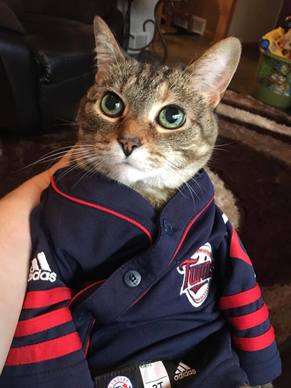
by Erik Ritland
Part One: On the Twins New Approach
The answer to apathy is opening the windows
Frankly, nobody cares about the 2017 Twins.
While a slight overstatement, it is truly only slight. After six years of monumental floundering, capped off by a team record for most losses in a season in 2016, apathy has set in. The fan base, such as it is, has rarely if ever been so disengaged.
There is reason for hope, however, one just has to take the longview. The Twins' new front office, led by the intelligent and savvy team of Derek Falvey and Thad Levine, has a new plan for the team.
Yes, you read that right: the Twins are doing something new, something different.
After years of being shackled to the shudder-inducing “Twins way,” the organization finally decided to become more progressive, hiring two men who use the outside-the-box thinking that has propelled teams like the Chicago Cubs and the Cleveland Indians (who both, by the way, were in the World Series last year; Derek Falvey spent the last nine seasons cultivating the latter). Although they have been dealt a bad hand with the current team, their new philosophy is already infiltrating the organization from the ground up.
The changes will come slowly and subtly, but building a contender from what they’ve been given can only be built that way. Which is why anyone complaining that the Twins didn’t make enough off-season moves doesn’t understand the process. Even the team doesn’t have any delusions that they’re going to be a contender this year, so throwing money or prospects away for superstars would have made no sense.
2017 is the first year of a definite rebuild, if not with players then definitely with philosophy. They’re transitioning from a static, old school way of thinking to a newer, more statistics based approach. While the rabid emphasis on the minutia of statistics is draining the blood from baseball, it only makes sense to pay attention to and implement the smartest ways to approach the game. New ways of measuring players can do that, they just shouldn’t become the only emphasis. The eye test, tradition, and feel still should play an important role. Falvey and Levine lean towards the newer philosophy, and that breath of fresh air for the organization is good and necessary, but they’ll only be successful if they look further than cold, isolated statistics.
 Here's a picture of a cute little kitty cat in Twins garb. What would you rather see, this or a picture of Falvey and Levine? From the Twins Facebook page, used under Creative Commons.
Here's a picture of a cute little kitty cat in Twins garb. What would you rather see, this or a picture of Falvey and Levine? From the Twins Facebook page, used under Creative Commons. The question is, of course, whether the Pohlads will spend money on the team once they get further in the rebuilding process. History shows that the organization, despite having the richest owners in baseball, doesn’t spend any more money than the team brings in. Although worth over three billion dollars from various endeavors, no outside money is used on the team, which gives the message that they only care about the Twins inasmuch as they make money from them. It might make sense from a business perspective, but that stinginess isn’t lost on a fan base that is currently paying for a large portion of Target Field. Most owners see their baseball team as a passion, which puts them in the same space as the fans; to see it as simply a business is greedy and backwards.
That’s not to say, of course, that they should just throw money around unthinkingly. But being competitive means spending money, especially on pitching, and the Twins have never done this. Sure, a Johan Santana will inevitably rise to the top from inside the organization every ten years, but depending on that in the long term is foolish. In 2017 a team needs to spend $20+ million a year on an elite pitcher – or two. A couple power hitters are necessary, and they don’t usually come cheap either, but both offense and defense are more a game of balance and depth that doesn’t necessarily have to cost as much to build (see, again, the Cubs and Indians). But no team excels without throwing massive amounts of money at pitchers; that’s just the way it is.
If Falvey and Levine build the Twins to respectability, and the organization still isn’t willing to spend money on some big name players to fill the gaps, it’ll all be for nothing.
For now, though, fans need to be patient and take a long term approach. I know, they’ve been told that for years, but things are finally actually changing. Nobody, especially the organization that got the team into this current mess, can begrudge fans for checking out. But a rebuild is currently in the hands of a new team with a forward-thinking approach, and they have a lot of talent to cultivate, so there is reason to be optimistic.
Even 2017 might not be that bad. But a lot of things have to go right.
To find out what has to go right for the Twins to be successful in 2017, check out Part II here.
Erik Ritland is a writer and musician from St. Paul, Minnesota. His blog and podcast Rambling On features commentary on music, sports, culture, and more. He was also Lead Staff Writer for Minnesota culture blog Curious North. Support Erik's music via his Patreon account, reach him via email, or find him on Facebook and Twitter.
 RSS Feed
RSS Feed
